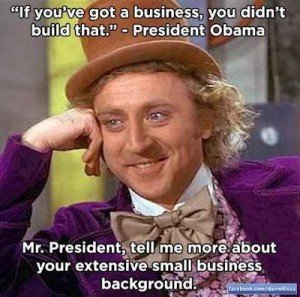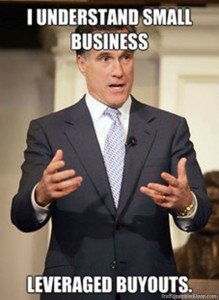
Why politicians should have started and built a business
As I get older I seem to feel increasingly disdainful of most politicians, not least because I am coming to understand the complete bubble they work in, spending their time surrounded by arrogant and clueless Whitehall mandarins, policy wonks and cunning corporate lobbyists who monopolise their attention. Very, very few of these people, not least the politicians themselves, have any experience of ever having built or created a business. All of these government figures pay regular lip service to how entrepreneurship and small businesses are the lifeblood of the economy and vital to society’s well being, but they actually have no understanding of, or insight into, what society’s most responsible, independent and creative people need and want. It seems crazy to me that a country should be governed by the least able and most parasitic and why the electorate don’t demand that politicians should have at least had some experience of creating a profit generating enterprise.
I therefore believe its especially important that politicians have some personal experience of what it’s like to risk everything they have, to battle waves of new regulations and struggle to meet payroll for employees and be able to meet increasing tax liabilities. Small businesses, often scrambling to make ends meet, cannot afford to spend the vast amount of money that publicly listed corporates do on influencing and shaping policy and remain the least understood and most overlooked political constituency. As a result, successive governments submit to regulatory capture and the environment for entrepreneurship and genuine economic growth becomes ever more oppressive as all but the largest corporate institutions feel the brunt of ever increasing punitive taxes and cumbersome regulations.
One former US Senator once famously admitted, following time spent starting a business once he left office, that:
“If I had had firsthand experience about the difficulties business people face every day that knowledge would have made me a better U.S. senator and a more understanding presidential contender”.
However, the majority of politicians these days are in it for themselves, damagingly seeing politics as a career in itself and using their political influence to make money either during or after their time in government. They are cosseted with taxpayers money that shields them from the financial concerns of constituents, while they pass rules and regulations that they think sound good and are meant to serve a beneficial purpose, but they rarely take into account the consequences of the regulations they pass or how they’ll impact the business community and society as a whole.
Gordon Brown is the type of socially flawed and mentally unbalanced individual who could never run any type of business successfully, yet somehow his ‘talents’ for bullying, selfishness, peddling lies and preaching economically ruinous tax and spend policies were enough to see this monster somehow become the UK’s prime minister. Although perhaps unsurprisingly he was never actually elected. The current Obama administration is populated for the most part by community organisers, academics, economists, and financiers. I doubt whether 1 in 100 has any experience of running a small business into which they have risked their life savings. The current opposing political parties to Labour and the Democrats on both sides of the Atlantic are not much better, with Mitt Romney having thrived in the parasitic industry of debt fuelled leveraged buyouts which benefited from his political connections, while David Cameron has only ever worked in Westminster and lived off the taxpayer, other than a few years in PR for Carlton TV where he was obviously recruited purely for his close ties to the Conservative Party.
The other day it was interesting to hear Rohan Silva (a former special adviser to David Cameron and George Osborne) talk candidly about his experience in government. He is now starting a new life as an entrepreneur in London’s tech startup community and was talking at the inaugural “Chew the Fat” event. There’s a good write up of the interview in The Wall Street Journal. A central theme was how the incoming government had had to fight to loosen big business’s grip on government, and in particular on the civil service, which Silva consistently blamed for being out of touch with the entrepreneurial and small business community.
Silva told the story of one piece of European legislation, which he described as “heinous”, and how he had asked officials whether they’d spoken to any of the companies affected by the regulations, to which they replied that they had talked to Tesco and Microsoft. They were apparently pleased with this. The following two quotes from Silva also help highlight the same problem:
“To my mind the worst thing about the last government was that 95% of government contracts were going to companies with more than 250 employees,” he said. “In IT, 70% of IT contracts went to just seven companies. That means everything in government was worse than it needed to be: you weren’t tapping into the ideas and dynamism of the entrepreneurial community.”
“I remember the first economic speech the Prime Minister gave … I wrote in the final third about startups and disruptive innovation. I put in all these statistics which were all true, like 6% of high growth firms generate 60% of jobs. All that stuff I was arguing should skew government policy towards those companies. Whitehall kept taking the stats out, even though they were true. It didn’t feel right to them because these civil servants would never, ever encounter startups.”
In conclusion, I therefore believe that we should demand to be represented by more politicians who have actually achieved something in the real world before entering Westminster. At present Britain is cursed by professional politicians who progress from sixth form debating society through political party internships, un-winnable seat, safe seat to end up raking in big money in some supra-national bureaucracy or large corporate, or even enjoy a comfortable retirement in the Lords. Stephen Bainbridge, a professor in the US, has the idea that the US President and all high level appointees must have started a small business into which at least 75% of their net worth was invested and have operated said business for no less than three years in order to be eligible for office. I think this is good idea which should be supported and discussed further!


